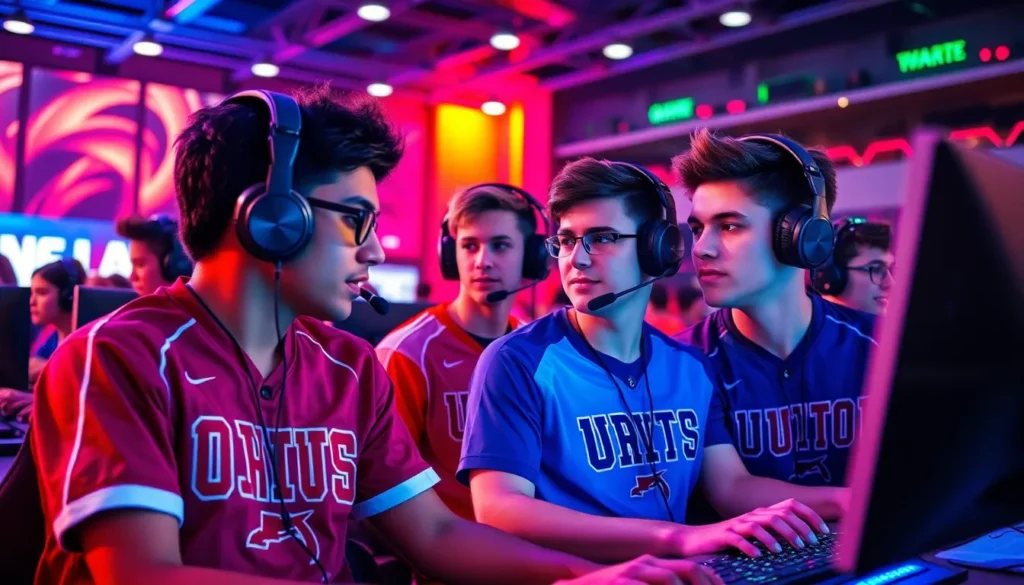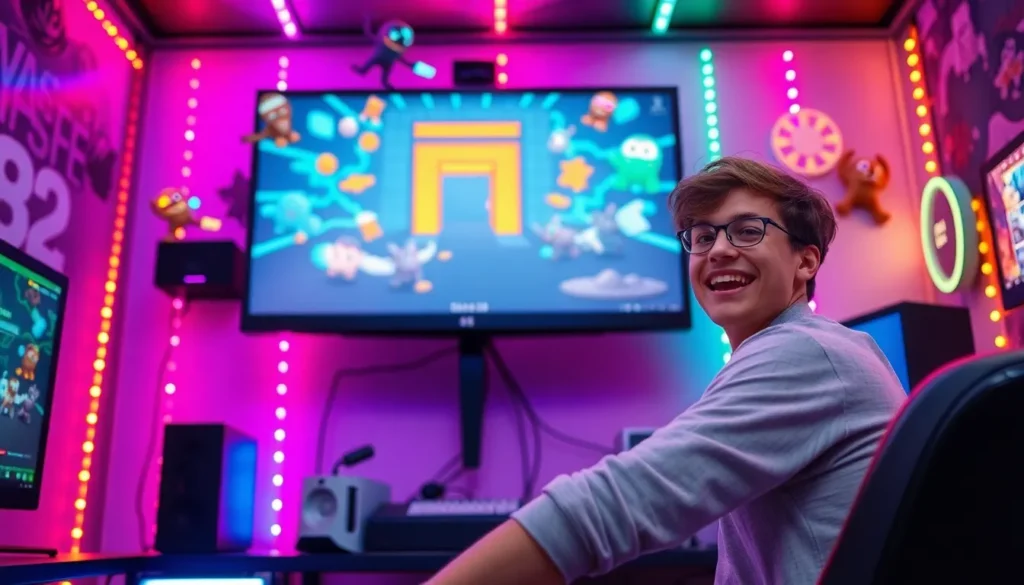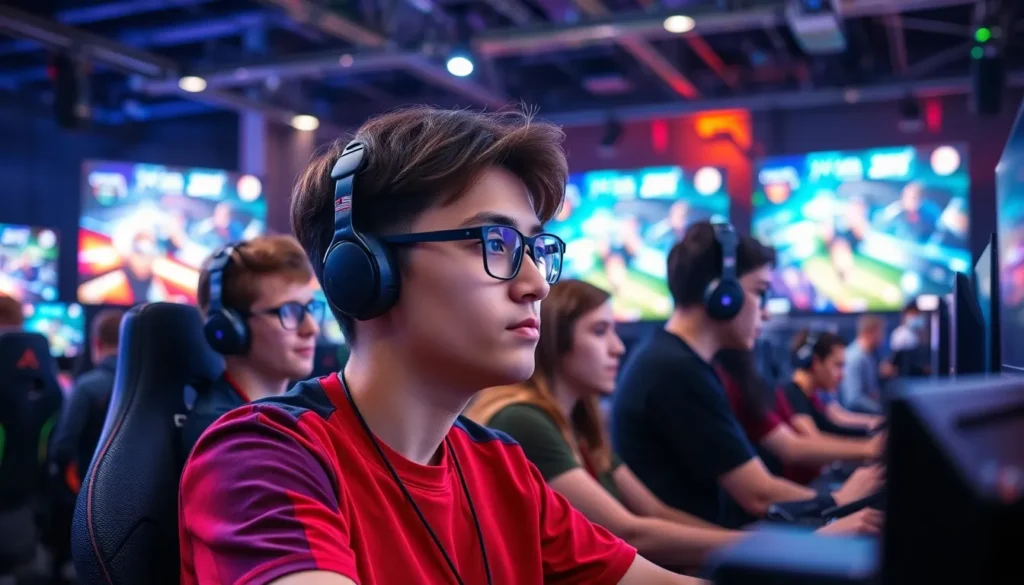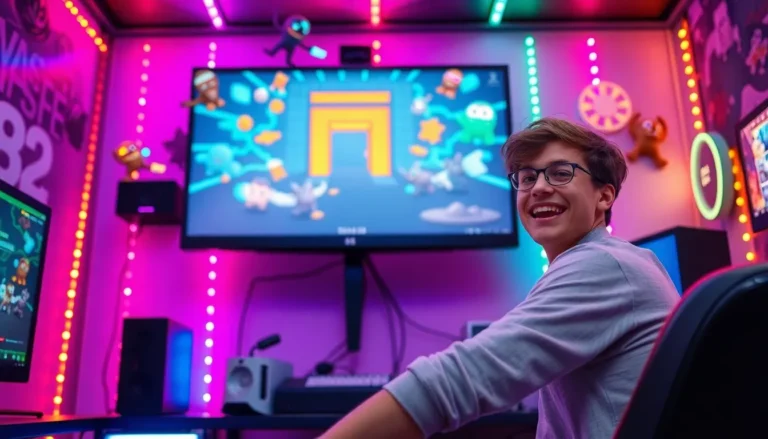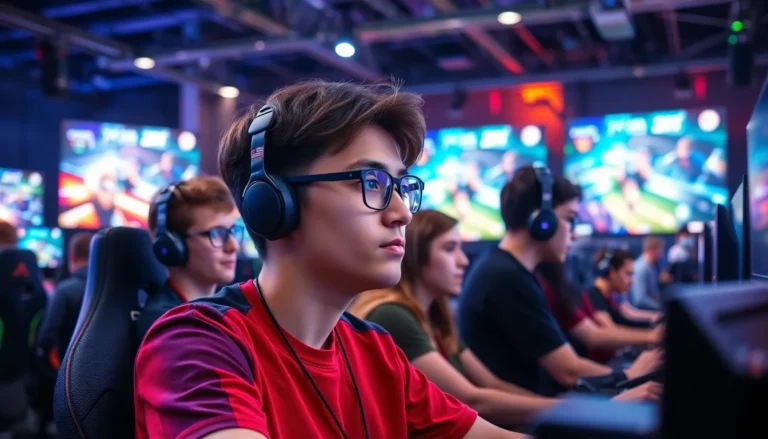Table of Contents
ToggleIn a world where gaming has transformed from a pastime to a powerhouse, colleges are catching on faster than a speedrunner at a marathon. Esports is no longer just a niche interest; it’s a full-blown phenomenon sweeping campuses nationwide. Imagine trading traditional textbooks for gaming headsets and strategy guides while still earning that precious degree. Sounds like a dream, right?
Overview of Esports in Colleges
Colleges are increasingly integrating esports into their campus activities. Many institutions recognize the potential of esports to foster community engagement and school spirit. Students can participate in varsity teams, cultivating skills in teamwork and strategy.
Programs in esports include competitive gaming, game design, and event management. Specific courses cover various aspects, such as game theory, marketing, and broadcasting, providing students with a comprehensive education in the gaming industry.
College scholarships for esports players are gaining traction. Various universities offer financial support to attract talent, similar to traditional sports. This trend encourages aspiring gamers to pursue higher education while competing at a high level.
Esports facilities are becoming common on campus. State-of-the-art gaming arenas provide students with opportunities to practice and compete. Additionally, colleges often host tournaments that boost visibility and engagement within the gaming community.
Career prospects in esports are expanding. Graduates possess skills applicable to various roles, such as game design, esports management, and marketing. The industry continues to grow, offering exciting opportunities for students eager to enter the gaming workforce.
Flexibility in academic scheduling is crucial for student-athletes. Many colleges accommodate competitive gaming with adjusted class times or online courses. This adaptability helps students balance their educational pursuits and gaming commitments effectively.
Engagement in esports enhances skills like critical thinking and problem solving. Colleges see value in the cognitive benefits of strategic gameplay, linking them to academic success. Participation in esports nurtures both personal and professional development for students.
Overall, colleges are transforming how gaming is perceived and integrated into educational frameworks. Esports serves as a platform for innovation and collaboration, positioning institutions to adapt to evolving student interests.
Benefits of Esports for Students

Esports offers numerous advantages for students in college. Engaging in competitive gaming not only enriches the educational experience but also promotes essential skills.
Academic Performance
Participation in esports often correlates with improved academic outcomes. Students who engage actively show enhanced critical thinking and problem-solving abilities, skills directly transferable to classroom studies. Studies reveal that gamers may excel in subjects like mathematics and science due to their experience with strategy and logic within games. Colleges also integrate esports into curricula, blending gaming with learning. This fusion encourages collaborative projects that deepen understanding and retention of academic material, ultimately fostering a more effective learning environment.
Social Connections
Esports serves as a bridge for creating social networks among students. Many gamers find camaraderie through team-based competitions, which help build friendships and foster a sense of belonging. Students often connect with peers who share similar interests, breaking down social barriers. Participation in campus events and tournaments further enhances interpersonal skills. Building relationships through esports leads to a supportive community, where collaborative efforts promote both personal growth and teamwork development.
The Rise of Esports Programs
Esports programs are gaining momentum in colleges across the nation. They attract students eager to blend education with competitive gaming.
Popularity Among Students
Interest in esports among students has surged. Many individuals view participation as an avenue for building community and showcasing skills. Competitive leagues are drawing large audiences, boosting school pride. Research shows that nearly 80% of college students express interest in esports, meaning this engagement is more than a trend; it’s a movement. Additionally, varsity teams are forming in various colleges, allowing students to thrive in leadership roles and collaborate in tournaments.
Institutional Support
Colleges recognize the value of esports, reflected in the growing athletic departments. Many institutions allocate resources for competitive teams, creating scholarships exclusively for esports athletes. With an increasing number of colleges establishing esports facilities, students find opportunities to practice, compete, and innovate. Furthermore, institutions often integrate esports into academic programs, offering courses that align with industry demands. Financial investment in esports initiatives demonstrates commitment, ensuring that students can benefit from this evolving landscape while pursuing their degrees.
Challenges Faced by Esports in Colleges
Esports programs in colleges encounter various challenges that can affect their growth and sustainability. Recognizing these hurdles aids in the development of effective strategies for their resolution.
Funding Issues
Funding issues represent a significant obstacle for many college esports programs. Many institutions struggle to secure sufficient financial resources to support teams and facilities. Budget allocations often prioritize traditional sports over esports, making it difficult for gaming initiatives to receive necessary support. Colleges frequently rely on donations, sponsorships, or partnerships with gaming companies to enhance their funding. The financial disparities among colleges influence their ability to attract talent and develop competitive teams. Sustained investment in esports facilities and staff remains crucial for program longevity.
Balancing Academics and Gaming
Balancing academics and gaming poses a critical challenge for student-athletes engaged in esports. Students often face demanding schedules that require juggling class commitments with practice and competition. Many institutions provide flexible academic options, such as online courses and adjusted class times, to accommodate student needs. Yet, maintaining a healthy balance between gaming and education continues to be a struggle for some. Time management skills are essential for students striving to excel in both realms. Failure to prioritize academic responsibilities can result in negative consequences for their future. Colleges that emphasize academic support alongside esports participation enhance student success rates.
Future of Esports in Colleges
Esports in colleges indicates significant growth and innovation. Continued investment in facilities supports this expansion, enabling students to train in high-quality environments. Many institutions recognize the increasing demand for esports programs and create dedicated e-gaming arenas.
Scholarships for esports players become more prevalent, promoting academic achievement alongside competitive gaming. As colleges place emphasis on this funding, they attract talented players who excel in virtual sports while pursuing their degrees.
Career paths in esports are diversifying rapidly. Graduates can secure positions in game design, management, and content creation. These roles frequently require skills honed through both gaming and formal education.
Partnerships with leading gaming companies yield additional resources for universities. Collaborative efforts enhance course offerings, bringing industry knowledge directly into classrooms. Integration of esports-related subjects furthers the educational experience while meeting student interests.
Balancing academic work and gaming remains a challenge. Institutions increasingly implement flexible class schedules and online learning options to ease this conflict. As student-athletes navigate these demands, academic support systems play a critical role in their success.
Participation in esports fosters critical thinking and teamwork skills. Students often find that strategic gameplay translates to better performance in the classroom. Social connections thrive through team interactions and communal events, enhancing the campus experience.
With nearly 80% of students expressing interest in esports, a vibrant culture emerges. Colleges actively participate in tournaments, creating school spirit and camaraderie. As this trend continues, esports is poised to reshape the educational landscape, aligning with student aspirations for innovation and competition.
Esports in colleges represents a significant shift in how education and gaming intersect. As institutions invest in facilities and scholarships, they’re not only enhancing student engagement but also preparing graduates for diverse careers in the gaming industry. The integration of esports fosters teamwork and critical thinking skills that translate to academic success.
While challenges like funding and time management persist, colleges are adapting to meet the needs of student-athletes. The growing interest in esports suggests that this trend is here to stay. As campuses continue to embrace esports, they’re cultivating a vibrant culture that celebrates competition and collaboration, ultimately reshaping the educational landscape for future generations.

